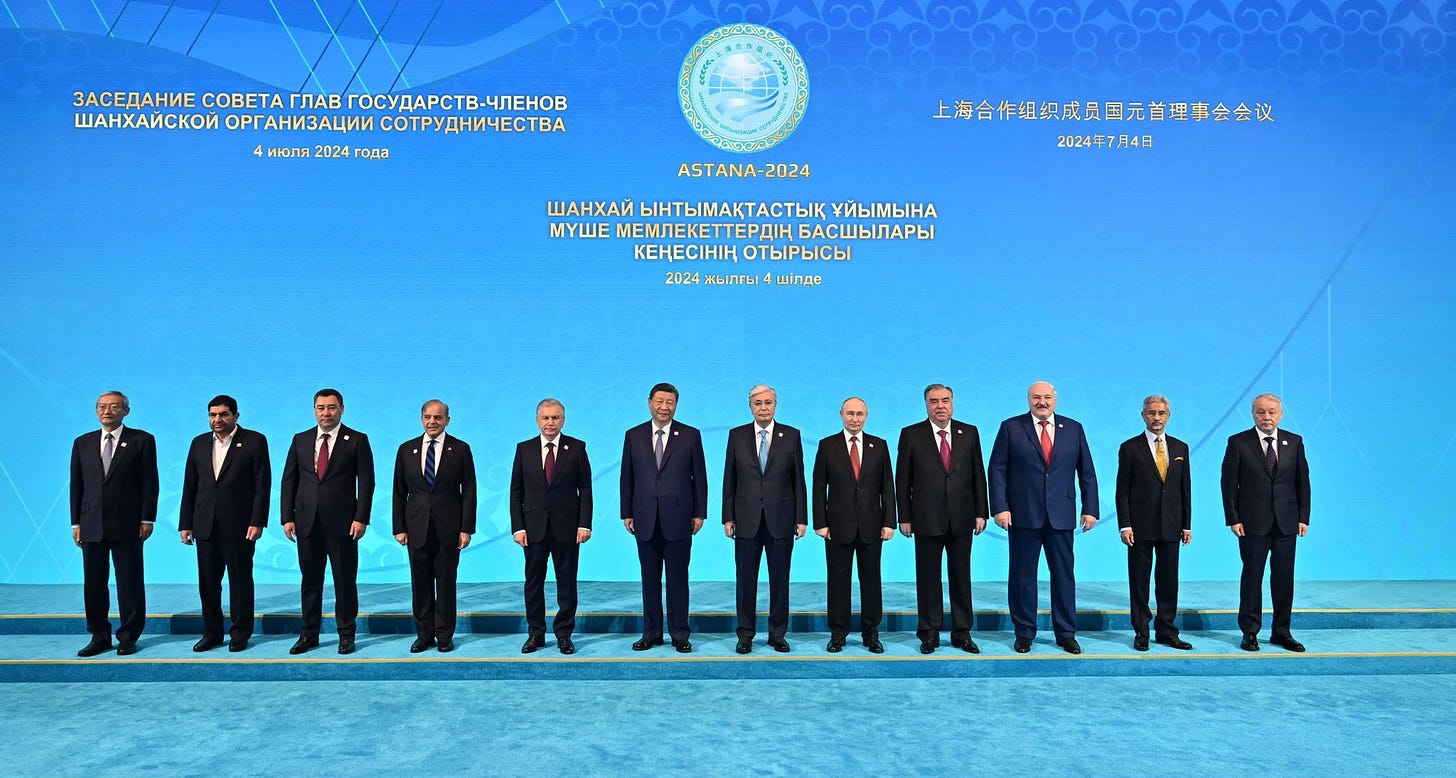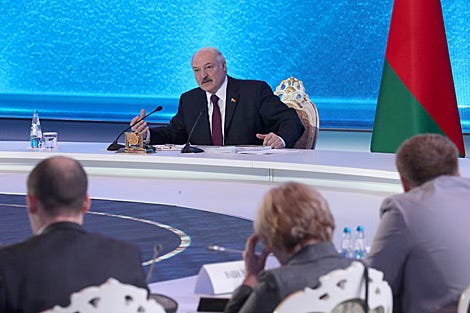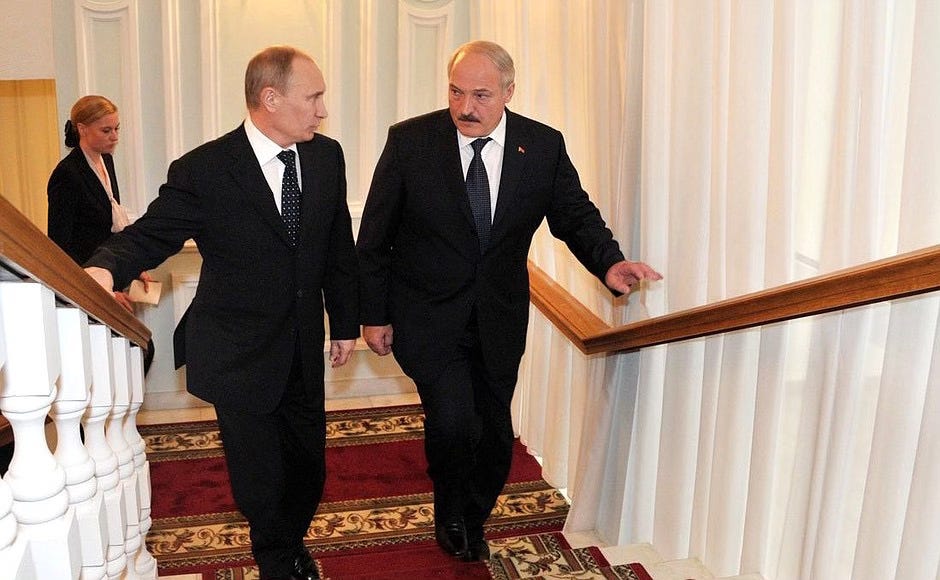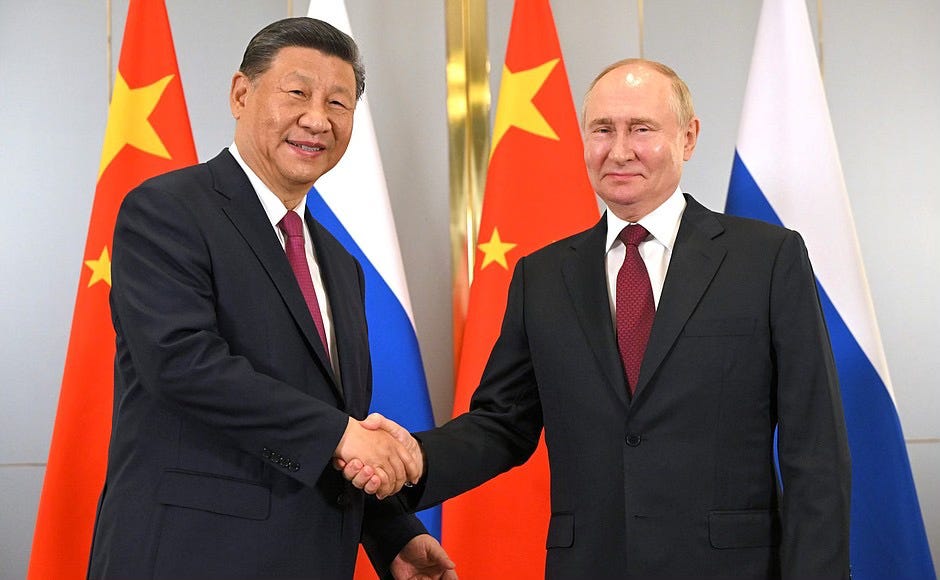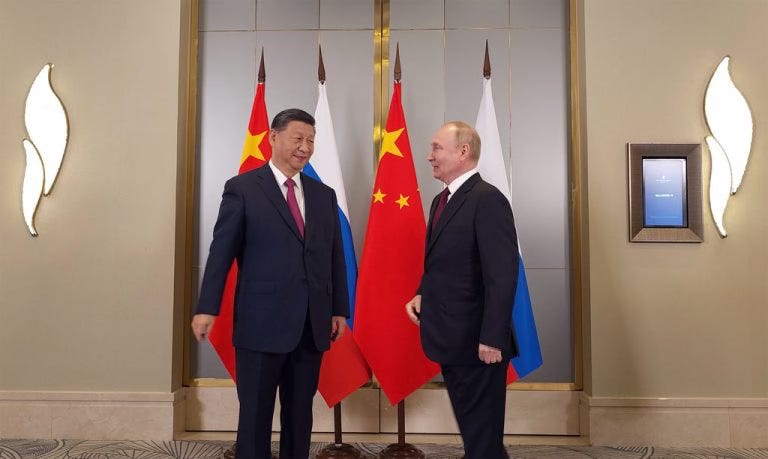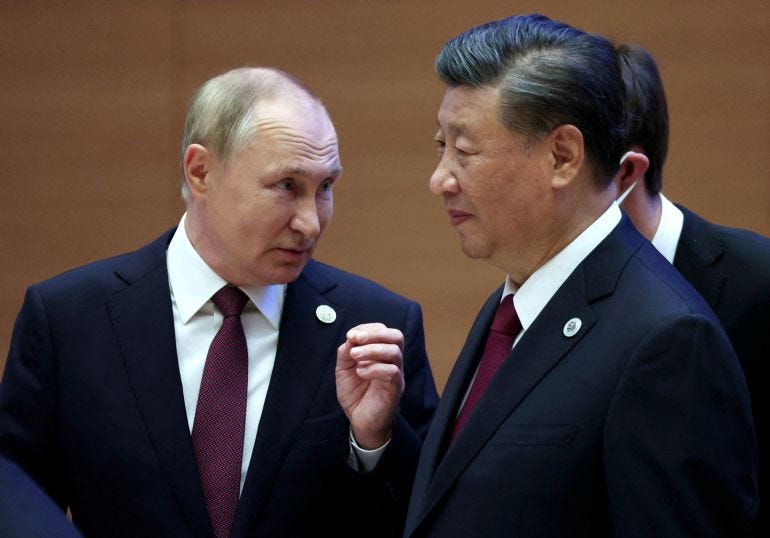Tectonic Shifts
Shanghai Cooperation Organisation (SCO) Welcomes Belarus As Its 10th Member State, Putin, Xi and Lukashenko speeches, China and Russia highlight ‘tectonic shifts in global politics’.
SCO Welcomes Belarus As Its 10th Member State
By Asian Times
ASTANA – The 24th summit of the Council of Heads of State of the Shanghai Cooperation Organization (SCO) began with a signing ceremony to admit Belarus as a full member state of the organization.
President Kassym-Jomart Tokayev congratulated Belarusian President Alexander Lukashenko on this occasion.
“The SCO has become an important mechanism in the international relations system and significantly contributes to sustainable growth,” he said.
President Sadyr Japarov of the Kyrgyz Republic highlighted the SCO’s increasing partnership potential, emphasizing the importance of its commitment to active political and diplomatic resolution of conflict situations. He also shared the country’s plans to host an SCO youth digital forum.
President of China, Xi Jinping, and acting President of the Islamic Republic of Iran, Mohammad Mokhber, noted Kazakhstan’s positive role in the SCO’s chairmanship.
President of Russia Vladimir Putin prioritized maintaining the security of the SCO member countries. He expressed support for resuming activities of the SCO-Afghanistan contact group, believing it will contribute to further normalization of the situation in Afghanistan.
Belarus is very proud of becoming a full SCO member
Opinions & Interviews (4 Jul 2024)
MINSK, Belarus is proud of becoming a full member of the Shanghai Cooperation Organization. Belarus President Aleksandr Lukashenkomade the statement during the SCO+ meeting in Astana, Kazakhstan on 4 July, BelTA has learned.
Aleksandr Lukashenko said: “Belarus is very proud of becoming a full member of the Shanghai Cooperation Organization. And we will bolster the Shanghai spirit of the organization based on principles of mutual respect, equality, and solidarity.”
He assured that as a European country Belarus will do everything to make the Shanghai Cooperation Organization a global organization. “Allow me to assure you that Belarus will religiously stick to humane principles, which our organization advocates. Have absolutely no doubt that Minsk will occupy a worthy place among the capital cities, which are represented here. We have something to offer in concrete cooperation avenues. We have nearly ten years of observer state experience in the Shanghai Cooperation Organization, stable political contacts and economic ties with all the members of the Shanghai Cooperation Organization,” the president stated.
He invited everyone to take part in cooperation and said the following phrase in Belarusian: “We will be glad to welcome you in hospitable Belarus with open hands, dear friends!”
Belarus full membership will boost cooperation and trade
Republic of Belarus has been participating in the Shanghai Cooperation Organization since 2010 as a dialogue partner and since 2015 as an observer. On Sept 16, 2022, within the framework of a meeting of the Council of Heads of State of the SCO in Samarkand, Uzbekistan, a decision was made to initiate the procedure for Belarus to join the SCO. And in July, 2023, a memorandum of obligations for Belarus was signed to enable it to become a full member state of the SCO.
The Chambers of the National Assembly of Belarus adopted Law No 275 in July 2023"on the accession of the Republic of Belarus to international treaties within the framework of the Shanghai Cooperation Organization". The admission of Belarus as a full member of the SCO is scheduled at the 2024 SCO Summit in Astana, Kazakhstan.
Self-determination of foreign policy
The accession to the SCO would be an important act of foreign policy self-determination for Belarus. In his speeches at the SCO summits, Belarusian President Alexander Lukashenko has focused on the potential of the SCO, in particular, to stimulate trade and economic cooperation through industrial and technological cooperation, digital transformation, the green economy and other fields.
Belarus considers the SCO to be an important international platform for establishing specific mechanisms for promoting cooperation in the field of regional security and countering terrorism, extremism, organized crime, and advocates for strengthening the economic dimension of the SCO as the most important factor of stability in the Eurasian region.
First, the activation and expansion of the dialogue of cultures is one of the most effective ways of eradicating terrorism and violent extremism, separatism, and trafficking of drugs, weapons, nuclear and radioactive materials, organized crime and illegal migration. These challenges have become transnational issues. Cooperation has already been established in many areas of cultural and humanitarian cooperation in the format of inter-parliamentary interaction.
Second, in recent years there has been an expansion of the SCO security agenda. There is an urgent need to build a universal, comprehensive, inclusive, transparent infrastructure of indivisible and reliable security and sustainable growth in the region. Also, Belarus is open to cooperation and dialogue in order to ensure food, energy and information security.
And third, the creation of a common transportation network in the region covered by the SCO will ensure trans-boundary multimodal transport, and help develop the required transport infrastructure and system for integrated management of traffic flows using digital technologies. Belarus has many strengths for effective cooperation in the trade and economic sector (energy, information and technology and agriculture, for example), which will help address new challenges and threats in the economic sphere. This will help establish cooperation in the banking and financial spheres and create financial mechanisms within the SCO.
In the current geopolitical situation, Belarus needs easier access to international markets. Improving the common transport space, trans-boundary transport network, and coordinated development of highways, as well as diversifying the export potential of the Union State of Russia and Belarus and the Eurasian Economic Union in the SCO region is of interest to Minsk.
The most promising areas for Belarus' cooperation in the SCO are industries and technologies, digital transformation and artificial intelligence, the green economy and climate adaptation, development of peaceful nuclear energy for civil use, and the use of cost-effective and environmentally-friendly technologies, eliminating trade barriers.
Other promising areas of cooperation
The formation of a single market and a free trade area of the SCO would promote healthy competition for the products of member states and counter the protectionist and sanction policies, and trade wars of the United States-led West. It will also play a significant role in organizing multimodal transport, improving the transport infrastructure and transit potential.
Belarus' entry into the SCO will certainly strengthen relations with the organization's other member states in areas of mutual interest.
A relatively new area of cooperation is cross-border cooperation. Taking into account the increase in terrorist threats on the external borders of member states (those not shared by the SCO members), the level of interaction between border services should be increased.
It is also important to establish a mechanism for jointly safeguarding the security of the information space, in order to prevent threats to the political, economic and public security of the member states. There is also a need for the SCO to strive for the adoption by the United Nations of a "Rules of Conduct in the Field of Ensuring International Information Security" and based on this, work with other members of the international community to formulate unified international regulations for the information and communications sector, and establish cooperation in this area.
Need to safeguard Eurasian security
In the context of new global challenges and threats, the SCO regional structure has sufficient potential for the members to implement the required measures to safeguard the security of the SCO space. Safeguarding Eurasian security in the context of rising geopolitical tensions is becoming an urgent task for the SCO, with SCO participants expressing the desire to coordinate the organization's actions within the UN and in the Eurasian space with such structures as the Eurasian Economic Union, the Association of Southeast Asian Nations and BRICS.
It is also necessary to strengthen interaction between the SCO and the Collective Security Treaty Organization. Belarus has the experience of participating in CSTO peacekeeping missions and supports regional management of collective security systems through peacekeeping operations and military cooperation.
Military cooperation can be significantly strengthened by joint efforts to counter radicals and armed extremists within a country, and the introduction of uniform standards in the armed forces will facilitate compatibility and high-level training within and between the armed forces. This will ensure the situation in the region, despite all the complexities, remains stable and predictable, which in turn will boost cooperation in all areas described in the SCO Charter.
By becoming a full member of the SCO, Belarus will not only be able to strengthen its political position in the international arena, but also have the opportunity to promote its products in new markets. Belarus supports the SCO's policies to counter trade wars and curb protectionist measures.
Diversification of agricultural exports
Besides, Belarus will be able to use its future full SCO membership to diversify its agricultural exports by cooperating with other SCO members in accordance with principles of interaction among SCO countries in the field of smart agriculture and agro-innovation since the majority of SCO members are importers of agricultural products. And Belarus' participation in the SCO's food security program will allow it to supply its mineral fertilizers to the other SCO member states in large volumes.
Minsk can also envisage the economic benefits of intensifying its digital transformation, especially with the help of China, which is a leader in the production of computer and communications equipment, and on the strength of Belarus which has gained significant success in the development of electronic products.
An important area of modern trade is cross-border e-commerce. E-trading in the Belarusian Universal Commodity Exchange can help the country sell goods to the other SCO countries. As such, cross-border digital trade, and digitalization of transport networks and customs services should become a new area of cooperation among SCO member states.
Belarus also has huge potential when it comes to exporting engineering, machine tools and instrument-making products to the other SCO member states.
The author is deputy director of the Institute of Economics at the National Academy of Sciences of Belarus. The views don't necessarily reflect those of China Daily.
President of Russia Vladimir Putin:
Mr President, dear friend,
Chinese colleagues, friends,
We are all happy to see you again, this time on the sidelines of the SCO summit.
Allow me to start right where we left off at our last meeting. I remember how warmly you welcomed us all in China. I would like to thank you again for the hospitality you showed us, on behalf of my colleagues and myself.
We had very substantive talks, signed a joint policy statement and launched the Cross Years of Culture. Later on, as we visited Harbin, we had more opportunities to see how close the historical ties between Russia and China are.
Back to this meeting and tomorrow’s events – I would like to remind you that our countries stood at the cradle of the Shanghai Cooperation Organisation in 2001. As the number of participants grew – and tomorrow Belarus will become another full member of the organisation – the SCO also gained a bigger role as one of the key pillars of a just multipolar world order. We will certainly support China’s chairmanship of the SCO in 2024–2025 in every way.
We have repeatedly stated with good reason that Russia-China relations, our comprehensive partnership and strategic cooperation, are going through the best period in their history. They are guided by the principles of equality, mutual benefit and respect for each other’s sovereignty. Our cooperation is not directed against anyone. We do not create any blocs or alliances; we are simply acting in the interests of our people.
Russia and China continue the series of events dedicated to the 75th anniversary of diplomatic relations between our countries we are marking this year.
Trade is on the rise – we noted this during my visitto the People’s Republic of China, and we can reaffirm this today. We saw more positive trends in the first half of this year.
At present, Russia and China are combining efforts to consistently implement the Plan to Promote the Key Elements of Russian-Chinese Economic Cooperation until 2030, which was approved during your visit to Moscow in March 2023.
It is noteworthy that all forms of cultural and humanitarian exchanges are also expanding. Mutual tourist flow is growing: last year, over 1.2 million trips were taken, and, in January – May of this year, the visa-free package tours alone were chosen by more than 260,000 people.
Russian-Chinese cooperation in global affairs serves as a main stabilising factor on the international stage, and we continue to further enhance it.
This year, Russia holds the presidency of BRICS, another organisation created on our initiative, and we hope that you and our colleagues will take part in the Kazan summit in October.
Thank you.
President of China Xi Jinping (retranslated):
Mr President Putin, my dear friend,
I am very glad to see you.
It is true that holding meetings on the sidelines of multilateral events is not just a good tradition of ours, but also the symbol of the high level that Russian-Chinese relations enjoy.
In May, you had a successful state visit to China, and we were able to outline priority areas for further development of our relations in the year when our diplomatic relations mark their 75th anniversary.
Today, the agreements we have reached are being efficiently implemented, and our comprehensive cooperation is progressing as planned. Facing an international situation fraught with turbulence and changes, the two countries should keep upholding the original aspiration of lasting friendship, and sticking to the determination of benefiting the people, enhance the unique value of Chinese-Russian relations, cultivate new drivers of cooperation, and make tireless efforts to safeguard our legitimate rights and interests and safeguard the basic norms governing international relations.
Tomorrow’s summit in Astana will become a crucial event for the Shanghai Cooperation Organisation this year. I am ready to hold an in-depth discussion with you and our other colleagues on ways to strengthen the SCO and cooperation in various fields and help promote the sustainable development of the Organisation in order to build a closer community of common destiny of the SCO.
Thank you for your attention.
China and Russia highlight ‘tectonic shifts in global politics’
By Aljazeera
Comments come at the Shanghai Cooperation Organisation summit – a regional bloc that Moscow and Beijing see as a counterweight to US ‘hegemony’ on the world stage.
Russian President Vladimir Putin and his Chinese counterpart Xi Jinping were in Kazakhstan’s capital of Astana on Thursday for a gathering of leaders from the Shanghai Cooperation Organisation (SCO) – a regional bloc that Moscow and Beijing see as a counterweight to US “hegemony” on the world stage.
Xi called on the countries to “resist external interference” while Putin said “new centres” of political and economic might are on the rise.
“We should join hands to resist external interference, firmly support each other, take care of each other’s concerns … and firmly control of the future and destiny of our countries and regional peace and development in our own hands,” Xi told the summit.
“It is of vital importance to the world that the SCO be on the right side of history and on the side of fairness and justice.”
In a joint declaration, published by the Kremlin, the group noted “tectonic shifts in global politics” and called for the bloc to play an enhanced role in global and regional security.
“The use of force is increasing, the norms of international law are systemically being violated, geopolitical confrontation and conflicts are growing, and risks to stability in the world and the SCO region are multiplying,” it stated.
The final communique also called for an “early, complete and sustainable ceasefire” in Gaza with a “comprehensive and just settlement of the Palestinian question”.
The statement did not refer to Russia’s invasion of Ukraine or China’s dispute with Taiwan, but said the group had “mutual respect for sovereignty, independence and territorial integrity of states”.
‘A just world order’
Both Russia and China regularly rail against what they say is the US dominance of global affairs and are seeking to boost their influence and control, particularly in regions close to their borders.
“The multipolar world has become a reality,” Putin said in remarks at the summit, hailing the accession of Russia’s close ally Belarus to the bloc, becoming its tenth member.
“The circle of states that stand for a just world order and are ready to resolutely defend their legitimate rights and protect traditional values is expanding,” Putin said.
“New centres of power and economic growth are strengthening.”
Western-sanctioned Iran joined as a full Shanghai Cooperation Organisation member last year. Also attending the meeting on Thursday was UN Secretary-General Antonio Guterres, who is visiting Central Asia.
The SCO was founded in 2001 but has come to prominence in recent years. Alongside China, Russia and Belarus, its full members are India, Iran, Kazakhstan, Kyrgyzstan, Uzbekistan, Pakistan and Tajikistan.
It is intended to be a platform for cooperation in competition with the West with a focus on security and economics, and Central Asia in particular. SCO represents 40 percent of the global population and about 30 percent of its gross domestic product.
But it is a disparate group with many internal disagreements, including territorial disputes.
Russia’s invasion of Ukraine has further increased major powers’ interest in Central Asia, where Moscow is seeking to maintain its traditional sway, but where China now has strong ties through its flagship Belt and Road infrastructure project.
The West is also vying for influence in the strategically important region, rich in oil and gas and a crucial transport route between Asia and Europe.
In the final declaration, the bloc criticised the “unilateral and unrestricted build-up” of missile defence systems by unnamed countries and regional alliances – a common complaint of both Moscow and Beijing aimed at the United States.
Read more here.



